We already know Part 8 – flexibility in holiday travel planning and Part 9 – frequency of travel versus flexibility in travel planning the flexibility that various income groups treat selected elements of the travel package with (transportation, hotel, travel distance, etc.), and the correlation between the frequency of trips and the flexibility that various criteria which characterize a planned holiday trip are treated with. This time, we will explore how much the gender of travellers affects planning holidays.
We still assume that the criteria which characterize a tourist trip include the destination and dates of the trip, the anticipated budget (cost of a given package), selection of companions, climate at the destination of the trip, the type of accommodation, the type of transportation, and the distance to be covered to realize the dream holiday.
280 people agreed to participate in the study, and the number included 178 women and 102 men. Without taking into account the gender of the respondents, we obtained the following information about the flexibility regarding various aspects of a holiday trip (see Figure 1).
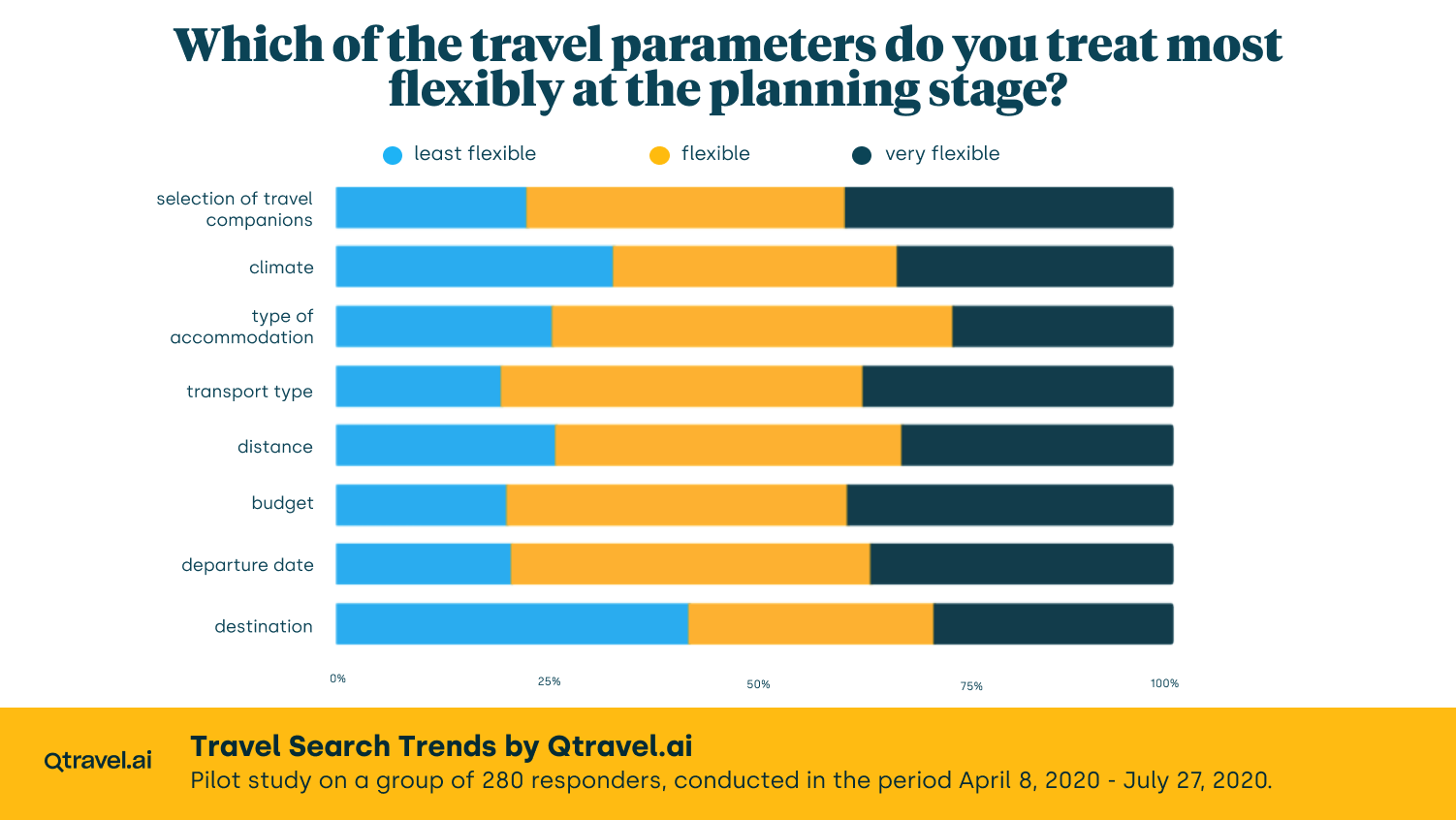
It is clear from the chart above that we are least flexible about choosing a companion, so it matters to us who will accompany us during our travels. This applies both to the decision of whether we travel with family, with friends, in a large group, or with the person who is closest to us, as well as the potential company at the destination. The other guests at the accommodation facility, resort, or the tourist location do make a difference for us. In relation to this criterion, the low level of flexibility means that we attach great importance to the selection of people who accompany us during travel and holidays. No other criterion, as the survey results indicate, is as important. Even the dates of departure, which only few people can be fully flexible about (the availability of holiday leave often requires arrangements with the employer and finding a substitute at work), came only second. We consider the selection of companions as the key factor of a successful holiday, more important than the factors which affect the price (e.g. transport and accommodation). When engaging in promotional and sales activities, it is worth keeping the above in mind: it is common knowledge that people buy with their emotions and only then rationalize the choices they make. If we put the issue of price first in the conversation with the client or let the client focus on it, then we will inevitably have to present financial arguments until the end of such a conversation. However, if we are able to focus their attention on the social factor, the issue of quality will come to the fore: whom we most like to spend our holiday with, what we want our dream holiday with loved ones, friends or the beloved person to look like, what kind of company in a tourist facility is particularly (un)desirable, whom we do not tolerate, and who will be welcome. By collecting such information, the seller is able to establish other criteria that will affect the ability to meet the purchaser’s expectations. For example, the purchaser may be convinced that one resort can be noisier and more crowded than another, and frequent parties may prevent it from maintaining a romantic atmosphere there. Or that the amenities for families with children at one resort are insufficient, and perhaps it is worth considering a slightly more expensive trip that the entire family will enjoy.
This will not free us from the thorny topic of trip price, but we will have a better negotiation standpoint, and {can use?} use the language of actual benefits for the client. One may go by the old saying that marketing, like sex, is all about meeting your partner’s expectations, while keeping your own benefits in mind.
Let us then take a look at the spectrum of responses from men and women against the total responses. The results are included in Figures 2 and 3.
The key criterion discussed above remains valid, regardless of gender: both women and men associate the quality of leisure with the presence of the right people around them. There is a clear difference, however, in the flexibility in terms of departure dates: men indicated a very low level of tolerance in this case, which is undoubtedly related to their professional obligations, while the majority of female respondents indicated a medium level of flexibility in this aspect, i.e. a relative ability to adjust departure dates to their own preferences rather than work commitments. This element should be taken into account by travel agencies, for example, in their marketing efforts – a last-minute offer aimed at men is less likely to succeed than in the case of women.. Men, on the other hand, should be approached with first-minute offers – since they are forced to plan their trips well in advance, they will probably be more receptive to this type of promotion.
The responses to the question about the direction of travel or destination country also yield quite different results. Men remain highly flexible in this regard (almost half of them declared that they did not mind which destination of their holiday stay they would choose). Among women, high flexibility was declared by only 1/3 of the respondents (the largest portion of them indicated medium flexibility). This aspect indicates that it is not worth focusing on the destination in sales negotiations and marketing communiques for men – it is better to focus on detailed parameters. First and foremost, are the aforementioned social issues and departure dates, followed by the distance to be covered, and the related issue of selecting a mode of transportation. Time constraints, together with a fairly high flexibility as to the choice of the destination country, make men express their preference for rather short rides/flights, and willingly choose less distant destinations, as long as they meet their other holiday expectations. Therefore, marketing conversations and online communiques (e.g. social media, mails, or promotional materials) should emphasize such issues as relatively short travel time and comfortable ride/flight. In the case of women, distance and choice of transportation are usually treated with medium flexibility, so they will not pay attention to these aspects when browsing online or talking to a travel agent.
Contrary to the perceptions of travel agents regardless of gender, respondents indicated significant (or at least medium) flexibility with regard to climate. This does not mean that the weather on holiday is not important to them, but it does not overshadow other aspects of organizing a holiday. If, when selling a tourist offer, we can demonstrate that there are many activities in the destination which are independent of weather conditions (sightseeing, sports, amenities in the hotel facility), then elements related to temperature or precipitation will prove to be less relevant to the decision-making.
However, there is a slight difference in terms of budget flexibility. According to the indications, neither men nor women put price over other elements (in both groups the responses of ‘high’ or ‘at least medium’ flexibility were dominant), but women remain slightly more tolerant. Men were more likely to declare that they remain inflexible when it comes to budgeting, and therefore a good salesperson should have strong arguments in order to convince men to change their holiday budget declarations.
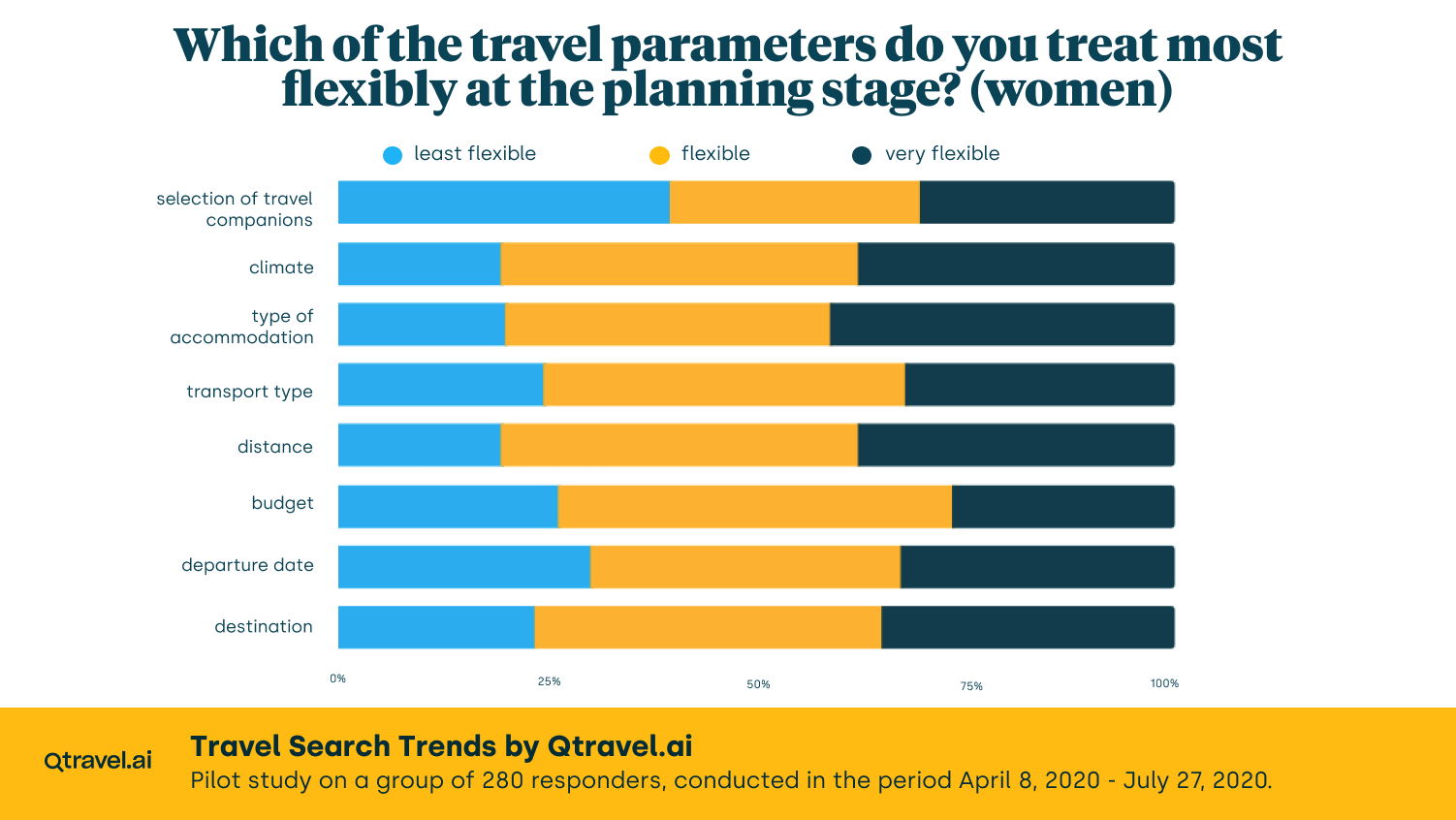
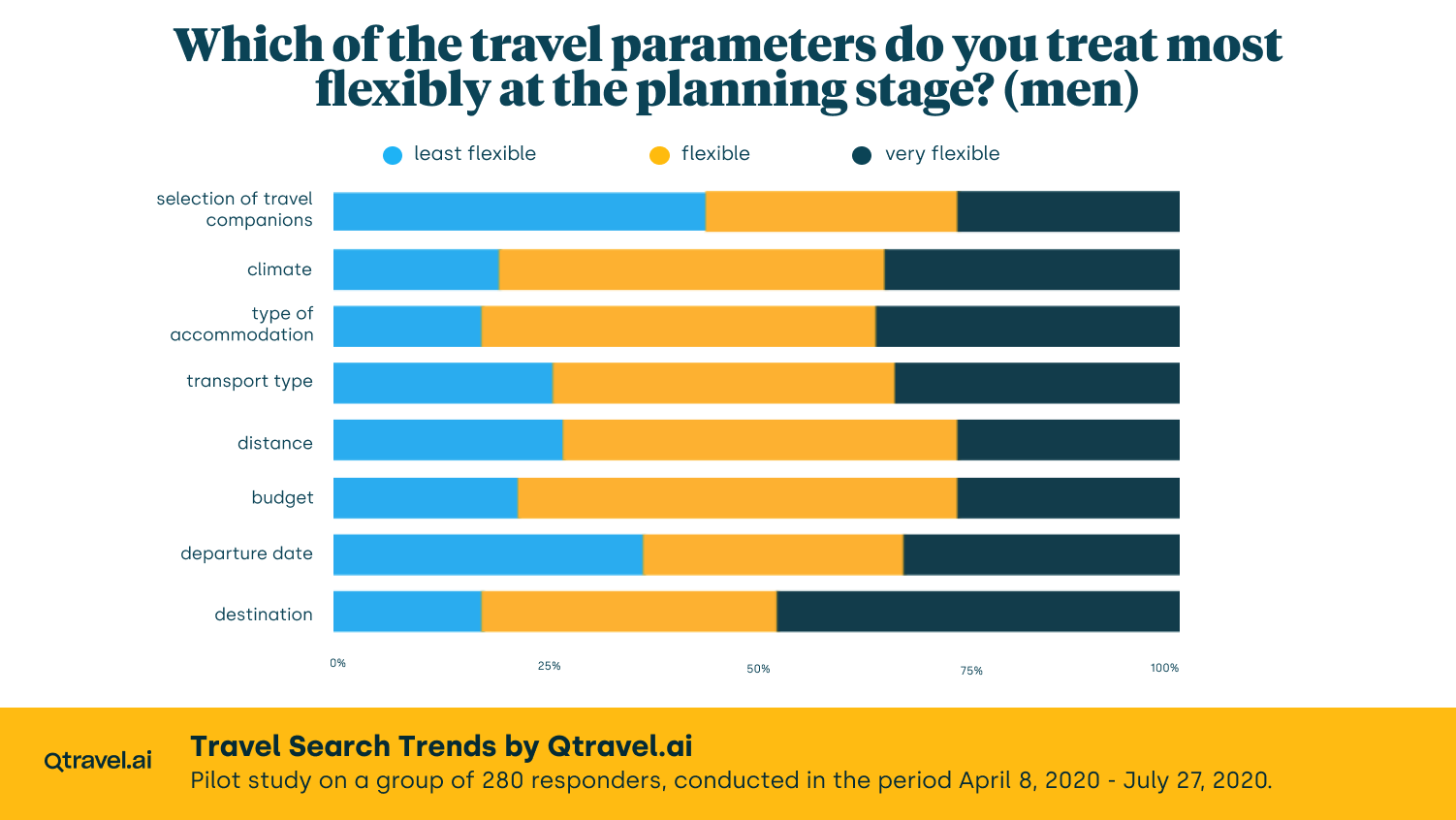
To ensure that the answers of the respondents are not random or poorly thought-out, the survey included additional questions. Therefore, in addition to finding out which travel parameters respondents treat with most flexibility, information was also sought on which parameters they consider most important at the holiday planning stage.
In the case of women, the budget issue (price of holiday) turned out to be one of the most important: although the number of indications that it was a key factor was not significantly higher than in the case of the date, the destination, or the choice of means of transportation, but in the case of price, only 9 people (5%) indicated that it was the least important parameter. Among men, only a few people also chose the answer ‘least important’ in the case of price, but in contrast, men were less likely to choose the answer ‘most important’ in this case. Chart 5 shows that parameters such as the destination and date of departure are more important to them than price. Surprisingly, on the other hand, such a parameter as the availability of adventures and attractions is valued relatively low in both groups: women still rank all other parameters slightly higher – and in the group of men the availability of adventures and attractions is perceived as significantly less important than the destination.
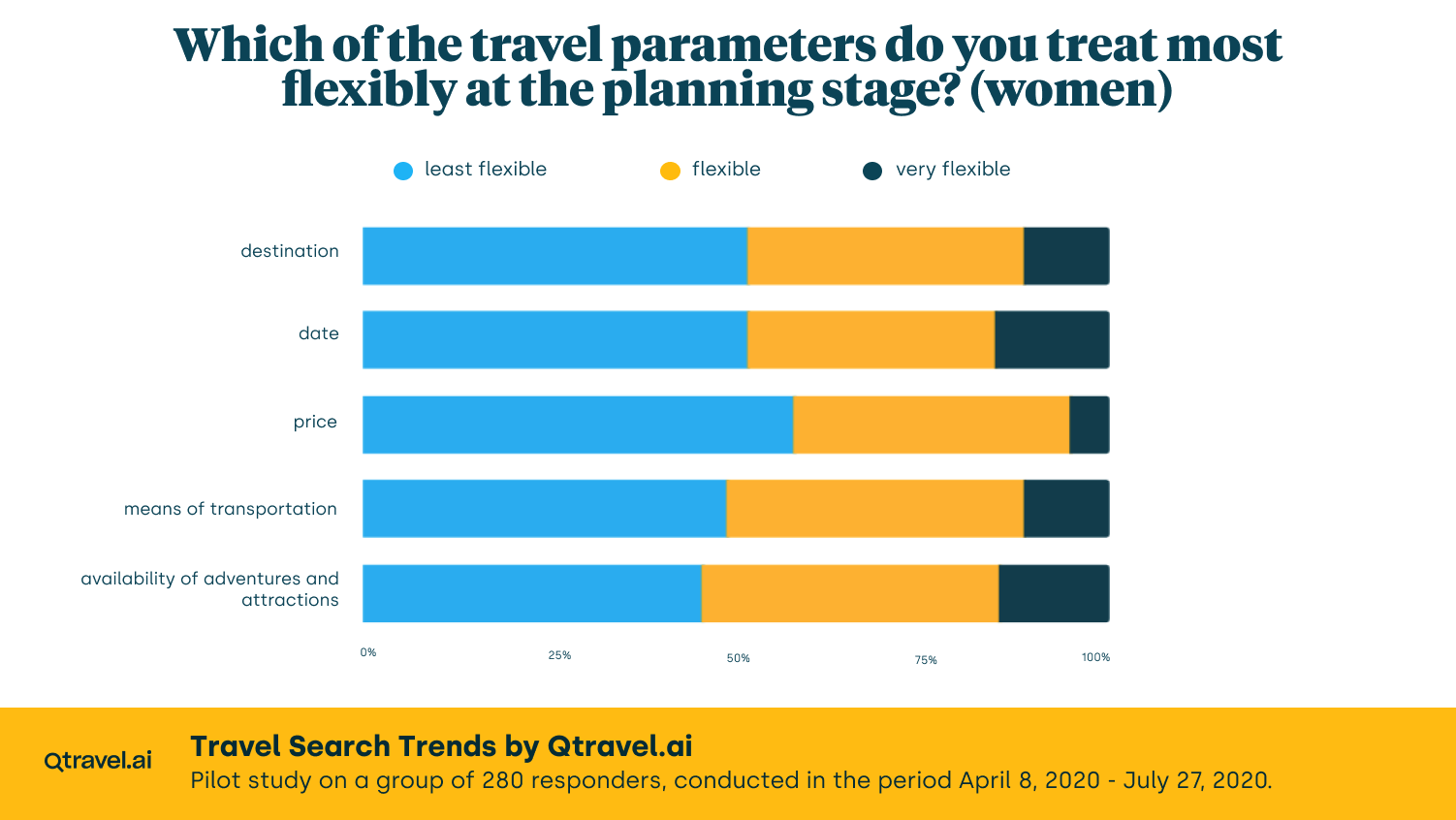
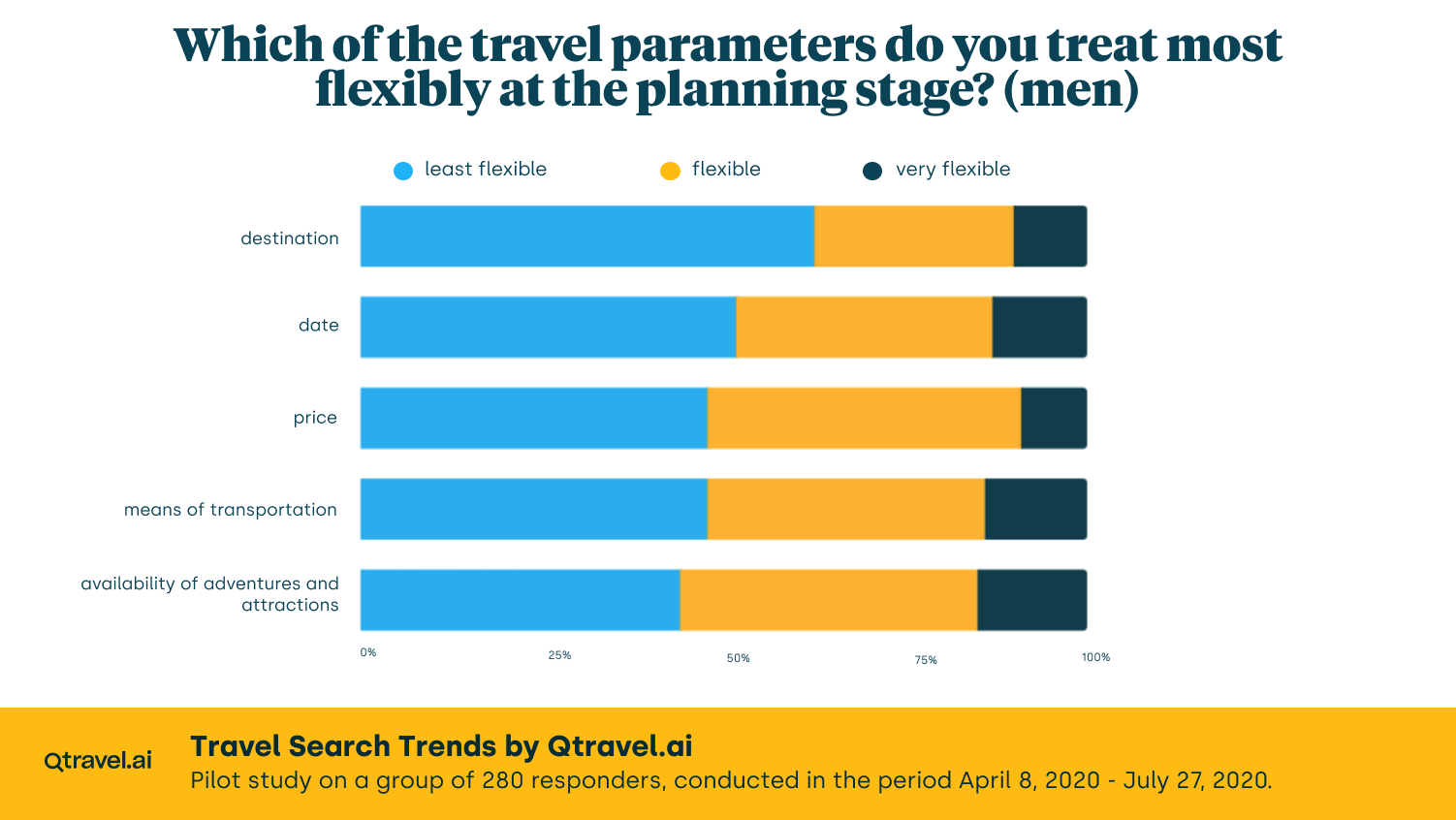
It is difficult to unambiguously determine the significance of this information. It may indicate that informing clients about the availability of attractions at a holiday destination will have little impact on their decision, which will be dominated by the other parameters anyway. This is quite at odds with the information encountered at every turn, that the younger generations of tourists are mainly focused on adventure, unusual experiences, collecting moments, and experiences. Mundane financial (price of the trip) and organizational (transportation) issues in the world full of tales about generations Y and Z prove to be as important as in any previous generation.
However, it can also be suspected that tourist destination regions and countries still do not place enough emphasis on communicating what sensations and experiences tourists can have. They leave marketing communications in the hands of entrepreneurs (hoteliers, travel agents), who focus on the technical aspects of their offers (location of the facility, transportation, food, and services available in the facility).
We encourage you to read the rest of the articles in this series:
- Part 1: Profile of the respondents.
- Part 2: How often do tourists travel during the year?
- Part 3: Do we like long holiday stays in Poland?
- Part 4: Poles travelling abroad part 1.
- Part 5: Poles travelling abroad part 2.
- Part 6: How far in advance do we plan tourist trips?
- Part 7: How far in advance do we plan tourist trips? – the income factor.
- Part 8: Flexibility in holiday travel planning.
- Part 9: Frequency of travel versus flexibility in travel planning.
- Part 10: Gender versus flexibility in travel planning.
